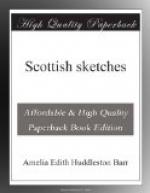He thought her also exquisitely beautiful, though this opinion would not have been indorsed by a majority of men. For Christine had one of those pale, statuesque faces apt to be solemn in repose; its beauty was tender and twilight, its expression serious and steadfast, and her clear, spiritual eyes held in them no light of earthly passion. She had grown up in that little back parlor amid the din and tumult of the city, under the gray, rainy skies, and surrounded by care and sin, as a white lily grows out of the dark, damp soil, drawing from the elements around only sweetness and purity.
She was very silent this afternoon, but apparently very happy. Indeed, there was an expression on her face which attracted her father’s attention, and he said,
“The sermon has pleased thee well, I see, Christine.”
“The sermon was good, but the text was enough, father. I think it over in my heart, and it leaves a light on all the common things of life.” And she repeated it softly, “O Thou preserver of men, unto Thee shall all flesh come.”
David lifted his bonnet reverently, and James, who was learned in what the Scotch pleasantly call “the humanities,” added slowly,
“’But I, the mortal,
Planted so lowly, with death to bless
me,
I sorrow no longer.’”
When people have such subjects of conversation, they talk moderately—for words are but poor interpreters of emotions whose sources lie in the depths of eternity. But they were none the less happy, and James felt as if he had been sitting at one of those tables which the Lord “prepareth in the wilderness,” where the “cup runneth over” with joy and content.
Such moments rarely last long; and it is doubtful if we could bear to keep the soul always to its highest bent. When Christine had sided away the dishes and put in order the little room, David laid down his pipe, and said, “The Lord’s day being now over, I may speak anent my ain matters. I had a letter, Christine, on Saturday, from my brother-in-law, McFarlane. He says young Donald will be in Glasgow next week.”
“Will he stay here, father?”
“Na, na; he’ll bide wi’ the McFarlanes. They are rich folk; but siller is nae sin—an’ it be clean-won siller.”
“Then why did Uncle McFarlane write to you, father?”
“He wrote concerning the lad’s pecuniary matters, Christine. Young Donald will need gude guiding; and he is my sister Jessie’s only bairn—blood is thicker than water, ye’ll allow that—and Donald is o’ gentle blood. I’m no saying that’s everything; but it is gude to come o’ a gude kind.”
“The McFarlanes have aye been for the pope and the Stuarts,” said James, a little scornfully. “They were ‘out’ in the ‘79’; and they would pin the white cockade on to-morrow, if there was ever a Stuart to bid them do it.”
“Maybe they would, James. Hielandmen hae a way o’ sticking to auld friends. There’s Camerons I wadna go bail for, if Prince Charlie could come again; but let that flea stick to the wa’. And the McFarlanes arena exactly papist noo; the twa last generations hae been ’Piscopals—that’s ane step ony way towards the truth. Luther mayna be John Knox, but they’ll win up to him some time, dootless they will.”




